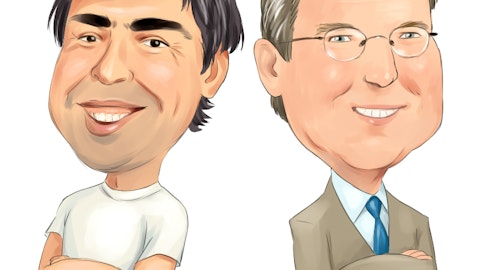Dell Inc. (NASDAQ:DELL) was down over 2.5% last week, and is down 35% year to date. Global weakness is causing a slowdown in PC sales, with an onslaught of tablets and mobile devices also taking the place of typical PCs in some marketplaces. Dell posted last quarter EPS of $0.50 compared to $0.54 consensus, with the company citing the continued uncertain economic environment and competitive dynamics as key reasons behind the disappointment.
Dell’s biggest competitor, Hewlett-Packard Company (NYSE:HPQ), will likely remain in turnaround mode for some time, with revenue expected to be down 5% in 2012 and 2013. HP is down over 40% year to date and the company is facing a number of external pressures, namely declining PC and printer sales. HP’s future will include its ability to navigate this decline with cloud computing services and breaking into the tablet market—see just how cheap HP is. The company recently guided EPS downward significantly for 2013 to $3.40-$3.60 with prior consensus forecast at $4.18.
Other competitor, Lenovo Group Limited (PINK:LNVGY), which actually pays a dividend that yields over 2% and is up over 20% year to date, has been making its mark in China. China consumed over 20% of global PCs in 2011 and Lenovo controls around 30% of this market. Lenovo is expected to continue to rely heavily on its China division as it enters the smartphone, tablet and TV markets. Unlike other top PC makers, Lenovo is expected to grow EPS around 15% annually over the next five years.
Not only are PC makers feeling the pressure, but Intel Corporation (NASDAQ:INTC), the chipmaker, has seen its profit slump as well. The company’s platforms and products are used in various PCs—see if Intel can survive the PC demise. Intel’s EPS growth is expected to be limited from 2012 to 2013, up to only $2.13 from $2.11, and week Intel posted EPS of $0.60 versus $0.57 for its last quarter. After the announcement, Roth Capital cut their rating, with analyst Krishna Shankar citing macro weakness that continues to cause weak PC demand. Roth also cut its price target to $20, compared to the current stock price around $21.25. However, Intel does pay the richest dividend that yields 4.2% of any of the stocks listed. Given this, some top fund managers continue to have interest in the company, including Ken Fisher and Jim Simons, with Simons upping his 1Q stake 75%.
Apple Inc. (NASDAQ:AAPL) has not only been causing problems for major smartphone companies, but also the major PC makers. While HP continued to lead the global PC market share in 2Q 2012, Dell was at number four and Lenovo was up to second. However, for the U.S. market share Apple is number three, with HP and Dell one and two, and Lenovo not in the top five. Yet, one headwind for Apple is that PC demand is being driven by emerging markets, with this market accounting for nearly two-thirds of unit sales. Apple, of course, has attracted the most fund interest, including David Einhorn and Tiger Global Management, each with over 13% of their 2Q 13 portfolios invested in the stock.
Both Dell and HP trade with similar dividend yields, around 3.5%. Dell, however, has the much larger beta at 1.4, while Hewlett-Packard’s volatility is at parity with the broader market averages. Dell is looking to move into new markets and implement operational efficiencies through networking and cloud services, but demand for IT systems and PCs will continue to put downward pressure on the company.
We cannot find a reason to invest in Dell right now, nor HP, for that matter. Dell’s revenues for full year 2013 are expected to be down 7%, then down 0.5% in 2014. We find it hard to see growth for the top PC makers, with Dell and HP expected to grow EPS over the next five years at 3% or less. We believe that Apple will continue its infringement on the PC market with its own line of desktops and laptops, and with its widely popular iPad line. Lenovo, meanwhile, will continue to outpace the other two major PC makers based on China’s growing population and rising living standards.






